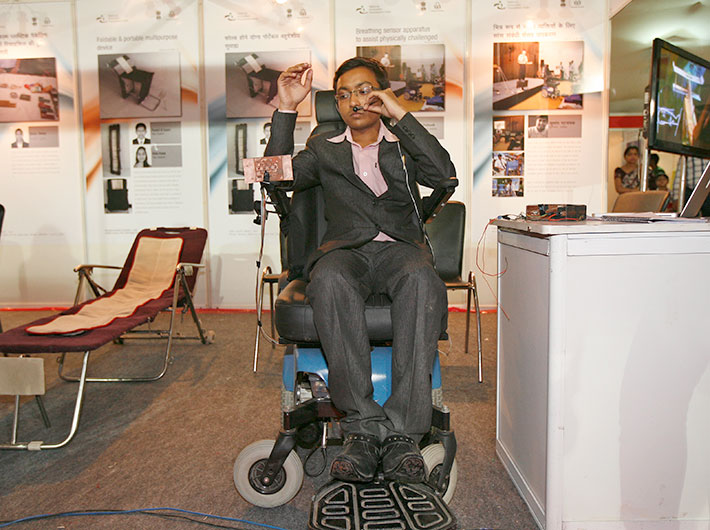A breath sensor apparatus developed by this Bhopal teenager allows paralysed and physically challenged to do their basic chores
Shahzad Khan lives in Bhopal and has a wheelchair-bound grandfather Muneer Khan to take care of. The 62-year-old had a terrible paralysis attack last year. Incapacitated and dependent on assistance even for small chores, he became cranky.
Then Shahzad heard from a relative about a breath sensor apparatus which when attached to a wheelchair allowed the occupant to move and do small chores without assistance. He bought it immediately.
His grandfather who has been using the device for many months now has got his confidence back and temper cooled.
“Initially, he had a problem in operating it. But with some training, he learnt it. Now he does not have to depend on anyone to move his wheelchair and to do basic chores like switching electrical appliances on and off and sending SMSes,” Shahzad says.
The breath sensor which has given a new life to Muneer Khan has been developed by 20-year-old Susant Pattnaik, who is studying engineering at Rajiv Gandhi Proudyogiki University in Bhopal.
Four years ago, Susant, then a tenth grader, went with his father to see a relative in hospital. There he saw a physically challenged patient in an adjoining room. He was entirely dependent on the nurse and was unable to express his needs. The helplessness in his eyes, his struggle for basic needs and his dependency on others struck Susant. After thinking over this for days, he concluded that even in a paralysed person, brain and breathing function properly.
Ready with his idea (to capitalise on these two strengths of a paralysed person and develop a device to help them perform basic chores), Susant developed it into a basic device a year later. Gradually he worked on the technology and improved it.
“Seventy percent of paralysed people cannot even speak; they are totally dependent on others for all their work. My machine can help them be independent. If they can breathe, which they obviously can, my device can perform tasks for them,” Susant says.
His device consists of a circuit which uses changes in the breathing pattern to activate and transmit electromagnetic signals. It thus enables paralysed or physically challenged persons to articulate their needs and be self-reliant in doing routine activities.
The device fitted to the wheelchair helps its user perform his routine tasks like moving forward, backward, ask for food or water, switching on and off electrical appliances and sending SMSes. A screen is fitted to the arms of the wheelchair where different tasks are mentioned. A light blinks on a regular basis on each task. One can select what one wants to be done by breathing with a slight force.
If a mobile phone is attached to the system, the person sitting on the wheelchair can even send the pre-saved SMSes without using the hands. And as no one can learn to operate the vehicle in first instance, this too needs some training before it is operated.
“I approached the National Innovation Foundation (NIF) when I was in class 11. Through their monitoring and financial support, I was able to develop the final product,” he says.
Susant’s device has been recognised by many organisations, including National Aeronautics and Space Administration (NASA), National Space Society (NSS), International Space Development Conference (ISDC), Massachusetts Institute of Technology (MIT), Intel, Innovation and Knowledge (INK), Kishore Vaigyanik Protsahan Yojana (KVPY) and National Children Science Congress (NCSC).
National Institute of Technology has filed for a patent for the innovation in Susant’s name. Also, NIF, Techpedia and the Armaan Foundation are incorporating this technology into a product form and will then help in commercialising it. Susant has himself sold 10 wheelchairs to date. He says he can even add the circuit to any wheelchair for Rs 10,000.
He is now working to add ‘accident-prone technology’ to the device, which will help the wheelchair to detect any kind of threat. A motivator at heart, Susant wants to start his own company and wishes to motivate other students to start their own enterprises instead of taking up jobs.
(This story first appeared in the April 1-15 of the print issue)

